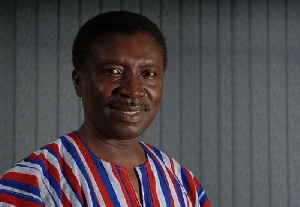 Professor Kwabena Frimpong-Boateng, Minister of Environment, Science, Technology and Innovation
Professor Kwabena Frimpong-Boateng, Minister of Environment, Science, Technology and Innovation
Ghana on Tuesday joined the international community to mark the World Environment Day with a call on the citizenry to all join hands in dealing with the plastic waste menace, by adopting the right attitudes towards waste management.
Ghanaians were also urged to change their attitudes on how they use so many plastics to bag their items or for shopping, and use straw baskets, and also stop using plastic straws for drinking beverages, and segregate their waste right from their homes, offices, and schools.
Professor Kwabena Frimpong-Boateng, Minister of Environment, Science, Technology and Innovation, who made the call to action on plastic pollution at the national event held in Accra said, the global community was focussing on plastic waste as the main theme of this year’s celebration because of the menace that plastics were causing to humans and marine lives.
The world event, adopted in 1974 by the United Nation, is marked on June 5 every year and enables the world to focus on the need to protect the environment from degradatio0n.
The Day has been celebrated across the world to raise awareness of current and emerging environmental issues such as pollution, overpopulation, biodiversity conservation, global warming, among others.
The 2018 celebration, was themed: “Beat Plastic Pollution, Reduce, Re-use, Recycle”.
The Minister said rapid urbanisation and economic development in many of the developing countries, had led to increasing plastic use and plastic pollution, saying there were more plastics in the ocean now.
He said available data indicated that plastic waste accounted for 95 per cent of total amount of waste generated in terms of weight, while plastic use had been in existence for over 70 years.
“Within this period, however, plastic has transformed everything from clothing, cooking, and catering to product design, engineering and retailing”, due to its advantage of lasting for a long time, nearly all the plastic ever produced, still exist in one form or the other today.
“It is estimated that the total volume of all plastics ever produced is about 8.3 billion metric tonnes, of this, about 6.3 billion metric tonnes is now waste-80 per cent of which are in landfills, and in the natural environment” he stated.
Prof Frimpong-Boateng noted that plastic does not biodegrade, but rather breaks down into smaller pieces forming plastic clouds of dust, and was found in the remotest parts of the world, which floats into the ocean and enter many marine animals and birds.
He said sea salts, in any part of the world, including Ghana, contained plastic dust, and that had some health implications on humans and its management was critical, especially in the developing countries where recycling machines arrived 50 years later after plastics were introduced in the countries.
The Minister said plastic menace was not only an environmental issue but also a major socio-economic development challenge and clearly among the tragedies of the 21st century.
He said in Ghana, the lack of clean drinking water, caused by pollution of most of the rivers and water sources, also exacerbated the problem of the use of plastic or sachet water, since most people in the country depended on sachet water for drinking.
Prof Frimpong-Boateng said Ghana was taking various measures in dealing with the plastic waste menace, announcing that the country, was developing a policy was to guide the use of plastics, and that would be heralded by an environmental education and awareness creation among the citizenry.
He said it would still be difficult for Ghana to ban plastic now and the country needed a policy and a legislative instrument for guidance and stress on education, and turning plastic waste to resources and value addition.
Mr John Pwamang, Acting Executive Director of the Environmental Protection Agency (EPA) said the theme for the celebration was critical since it emphasised on the need to beat plastic out of the environment because the microplastics were being emitted into the environment and causing health implications for the people.
He urged the private sector to join national efforts at dealing with the plastic menace.
Mr Louis Kuupen, UNDP Assistant Country Director, who represented the UN Secretary-General, Antonio Guterres, said the United Nations in Ghana was committed to supporting government efforts to protect the environment, including beating plastics pollution.
“In support of this new programme, I am happy to inform you that UNDP Ghana has just received seed funding for a new project that aims to create a digital platform to connect all stakeholders in the waste management chain and address the current information, coordination and knowledge gaps in waste management”.